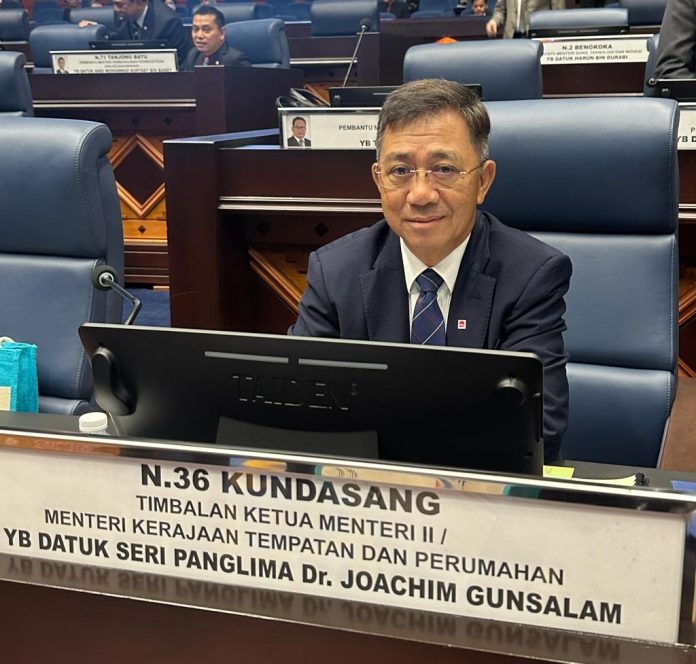KOTA KINABALU: The success of the Hala Tuju Sabah Maju Jaya (SMJ) Development Plan and other similar initiatives depends on the participation of local communities, civil servants and policymakers, said Deputy Chief Minister Datuk Seri Dr Joachim Gunsalam.
He said participation not only empowers people but also enables local government to establish methods through inclusive and effective involvement.
“I believe that inclusive and collaborative participation in local governing processes benefits both local institutions and the community.
“However, programmes should exist to ensure the involvement of the community in planning, implementing and monitoring of any development,” said Dr Joachim, who is also Local Government and Housing Minister, when officiating a “Seminar on Empowering Local Governance Through Inclusive and Collaborative Participation” at Shangri-La Tanjung Aru Resort and Spa here today. His speech was read by the Local Government and Housing Ministry’s Deputy Permanent Secretary I, Stanley Chong.
It was organised by the Institute for Development Studies (IDS) and Konrad-Adenauer-Stiftung (KAS).
Dr Joachim said local governance is the cornerstone of democratic governance and is critical for the delivery of essential public services, equitable development and inclusive growth.
He said local governments are the closest to the people and have the greatest potential to address their needs, aspirations, and priorities.
“Therefore, it is crucial that we empower local governance structures and practices to ensure that they are efficient, effective, and responsive to the needs of their communities,” he said.
According to Dr Joachim, the aspirations of the Sabah Government through the SMJ development plan require strong and competent local governance at the district level.
“A well-organised local government will effectively execute SMJ in stimulating economic recovery, improving the people’s economy, and developing human capital towards building a state and society that is united, harmonious, peaceful, developed and prosperous,” he said.
In Sabah, he said, the local authorities were established through provisions under the Local Government Ordinance 1961. This ordinance also outlines the responsibility and function of local councils in Sabah. The Local Government and Housing Ministry was created after the State Election in 1963 which governs the operation of local authorities in Sabah.
“The local government is the third tier of government in Malaysia and serves as an important mechanism to further the policies and to facilitate the implementation of relevant strategies and programmes of the federal and state governments.
“Apart from collecting taxes, creating laws and rules, granting licenses and permits for any trade-in its area of jurisdiction, it is also responsible for providing basic amenities, collecting, and managing waste and garbage as well as planning and developing the area under its purview. Local governments are usually referred to as local authorities and each local authority will be completed with the appointment of local councillors.
“Councillors play a critical role in ensuring that the needs and interests of their constituents are met as they act as the voice between the local communities and the government. The councillors are responsible for promoting economic growth and ensuring that the local economy remains vibrant and sustainable by delivering essential services, fostering community development and generating employment opportunities.
“They are also responsible for managing local government resources and making decisions on local development projects through various committees being set up at the local council level. This will contribute to building a more effective and efficient local government system that is responsive to the needs of all communities,” he said.
In lieu of this, he believes that the study to be undertaken by IDS in collaboration with his Ministry on assessing councillor’s profile in Sabah which also includes tapping into the issues and challenges in local government is crucial for ensuring representative governance, identifying skills and expertise gaps, enhancing accountability and supporting evidence-based decision-making.
“By collecting and using this useful data and information, local governments can improve their performance and effectiveness and better serve the needs of our communities. For this, I highly advise all council members to give their full support for the success of this study,” he said.
Dr Joachim said local governance is the “public administration of towns, cities and districts,” whereas local government is the governing body of a locality.
The local government is put in place by a state’s administration and their given roles are established after decentralization by the central government and instituted at a lower level as governing boards, he said, adding they carry out all the local governing by addressing issues at their respective communities.
“It is no doubt that local governments are essential actors in economic development in Sabah. They are more familiar with the local economy than any other level of government. They are in close contact with local stakeholders. They can also ensure that policies are adapted to local conditions, promote specific advantages and address important bottlenecks.
“Good Governance is a modern governance principle that is based on three main elements, namely accountability, transparency, and public participation. Therefore, it is crucial that all participants in this seminar, especially the district officers, executive officers, council members and stakeholders come together and work collaboratively towards improving local governance by leveraging each other’s strengths and expertise to create inclusive and sustainable solutions for our communities.
“The collaborative strength and cooperation will further develop the local government capacity and thus maximise administrative efficiency which is both indispensable to accelerating and improving the quality of economic growth in Sabah,” he said.
He also said it is high time this seminar is organised to further discuss how to strengthen the local government in Sabah.
“We want to see the local government transition to a new paradigm of collaborative governance.
“In this regard, multi-stakeholders such as public and private sectors, civil society, and public organizations, including women’s representation are empowered by working together as partners through strong collaboration.
“This can build trust in government, resolve societal challenges, ensure district economic growth, and transform development with a bottom-up approach from the grassroots level. Therefore, issues relating to the representation of different backgrounds of council members with the inclusion of more women, professional, and business communities should be given top priority,” he said.
Also present were the Chairperson of IDS (Sabah), Datuk Adeline Leong; Chief Executive Officer of IDS (Sabah), Datuk Dr. Ramzah Dambul; Director of Konrad-Adenauer-Stiftung (KAS), Malaysia, Miriam Fischer and members of IDS Board of Directors.


